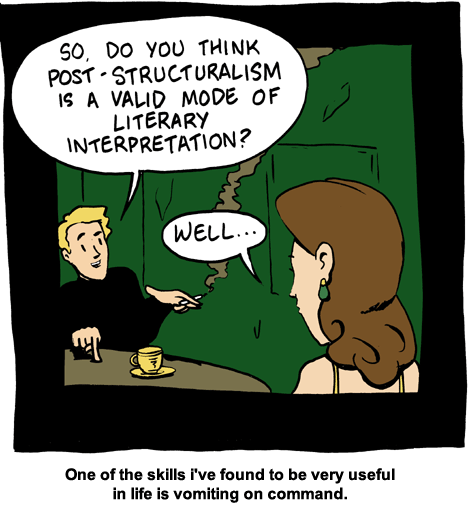
Thursday, December 4, 2008
Monday, May 26, 2008
WOOHOO FOR THE ONION!
Diebold Accidentally Leaks Results Of 2008 Election Early
By the way, this is fake news. Or at least you should pretend it is.
Friday, May 25, 2007
Who says today's music is lame...
All music should be done by Wierd Al, and in this format.
And for those of us that did our music listening in the 90s:
Wierd Al: Polka Power
Sorry for no new rants, some coming soon!
Abbot Chris
Monday, May 21, 2007
Friday, May 11, 2007
L'etats, c'est moi

A little international journey here at the Eremite, today we travel to the sun and wine drenched home of the Gauls, jewel of Charlemagne's empire, the birthplace of liberal revolutions (Edmund Burke correctly identified the American Revolution as a conservative revolution), the ever cultured nation of France. Recently, in a rather historic run-off, the neo-conservative Nicolas Sarkozy won the five-year term of president (and will take the reins from the impossibly venerable Jacques Chirac on May 16). The election was historic for two reasons, this marks the first time that there is a French president who was born after World War II and the first time a women was the prime contender for the seat (a Socialist even).
Well, this new finds the Eremite at a bit of a loss. On one side, I am relieved . One of Sarkozy's first statements was an explicit olive branch to the United States, one of the first since the diplomatic debacle over weapons of mass destruction, oil trade, and unilateral warfare that dealt a nasty blow to US-French relations at the beginning of the Iraq war. As New York Democratic senator Chuck Schumer said, "it would be nice to have someone who is head of France who doesn't almost have a knee-jerk reaction against the United States." Sarkozy's victory came despite the fact that Sarkozy's rival, the attractive communist Segolene Royal, directly compared him and his neo-conservative leanings towards "law and order" (some people charge him with being borderline fascist) with George W Bush. Does this mean that the French people, knowing the political climate in the United States, explicitly chose the candidate that would heal the rift? Are the French voicing a subtle support of U.S. foreign policy (ironic, perhaps George W's public opinion polls would be higher outside of his home nation)?
On the flip side, there is much about Sarkozy that raises cause for alarm. Despite his very Polish nom-de-familie, he proposes an increasingly restrictive immigration policy for the usually very open French borders (he states that France should not be the home for Europe's "miseries"). Sarkozy uses the rhetoric of conciliation and friendship with North Africa, but his proposed policies indicate a bit otherwise. North Africans were the major agitators in the recent riots that shook Paris last year, and North African immigrants make up around 3-6 million of metropolitan France's near 61 million inhabitants. Sarkozy's election was immediately greeted with rioting, partially due to his hard line stance against labor unions, with policies that would force public sector unions (which have an undue amount of power in France) to provide a minimum amount of service even during a strike. This may be quite palatable to any non-French who have been stuck in their hotel during a trip due to one of the many public transit strikes (this author included). Sarkozy leans on his mandate, 53% of the vote, as a clear sign that the unions should not (and cannot) resist his changes.
Certainly Sarkozy's popularity stems from the uncertainty, chaos, and unpleasantness of the last two year's riots. According to eye-witness accounts, even downtown Paris was shut down and barricaded to protect businesses from the violence. Similar to Bush's spike in popularity after 911, it may be that (in a trend that keeps up with historical precedent) France's voting citizenry moved decisively into the save and traditional arms of conservatism, which promises security and order (the people of France did this at least once before, and put in place Napoleon Bonaparte to pull them from the chaos of the Reign of Terror and the Directory). It certainly raises this author's suspicion that Sarkozy only openly criticized the Bush and the U.S. government's stance toward global warming rather than the human rights scandals (Gitmo, Iraqi prisons, phone tapping), the justice department scandals, the jingoism, or the deteriorating situation of the Iraqi war.
So what will five years bring for France? Only a few years ago, Le Pen was too radical, now the message has changed? Who knows, perhaps in five years there will be the social divisions that exists now in the United States, due to the polarizing between neo-conservatism and liberals? Will Sarkozy and his policies exacerbate the already stark socio-economic gaps, typically based on racial or religious (Muslim) divisions? Perhaps there will be a renewed strengthening of the US-French relationship, ushering in a rebuilding of the US presence in Europe? Or perhaps the French have fallen into a trap, choosing a familiar face to save them from social upheaval and terror.

If you know who this picture is... then you might get what I am saying...
Frankly, from the US standpoint, this is certainly the best way that the election could have gone. Certainly the current administration (and possibly the next one) would have little in common with the socialist Royal, who was openly hostile to both Bush and American endeavors.
Abbot Chris
Monday, May 7, 2007
The secret of creativity is knowing how to hide your sources
Albert Einstein said that. Seems my students might have taken a lession from that. As I am swamped with grading essays and preparing for tomorrow's midterm (not to mention my birthday), I will leave you with one of my favorite webcomics. It is certainly how every academic feels in seminars/meetings/conventions. Enjoy!

Abbot Chris

Abbot Chris
Wednesday, May 2, 2007
Mail your packages early, so the Post Office can lose them in time for Christmas

Ah.. Johnny Carson, America's late, great, funny-man. How right you were. Today's rant is a more personal one, but none-the-less still an important look at a problem in today's society. That problem, true believers, is that den of corporate waste and corruption that is the United States Postal Service.
So a little introductory story is in order. My wife, who many of you know is a hypnotist, was awaiting a business DVD that had been shipped to her by one of her clients. The point of origin, in the same city, was around 7-10 miles "as the crow flies" away from our home (a much longer distance in real terms). We had nearly given up hope of receiving the package when, lo, a rather crumbled brown square arrived in the mail last week. The post mark was dated March 15, despite its arrival in late April, and it was rather worse-for-wear. Upon opening, we found that the DVD (worth $40) was cracked and splintered. My wife, being the very emblem of the "squeaky wheel" of proverbial fame, decided to file a complaint with the USPS in hopes of compensation. She was flatly told that "the USPS is not responsible for uninsured items and that she could continue to fill out a local complaint, by reimbursement would be out of the question." Intractable, the post office flatly told her that it was not their problem.
This leads me to my rant. The USPS is an independent establishment of the executive branch of the US government, not a government owned corporation (although it is run similar to one). The Postmaster General is a indirect presidential appointee (ironically the current one, Jack Potter, is a Bronx native and a Fordham University graduate) and is given the title CEO. The Postal Service has an executive committee and is structured in many ways like a for-profit company but it remains a the most well known and largest employing part of America's bureaucracy.
However, the sole practical purpose of the USPS is to deliver mail (packages and letters) in a reliable, secure, and timely manner. It is expected by citizens (who could be viewed as consumers) that their packages go from point A to point B in one piece. What purpose does it serve to mail an object that arrives at its destination broken? Not only does this waste consumer money and result in a net loss for both the object and the shipping cost, but it also wastes the postal service's resources in the time, wages, fuel, etc, that was required to unsuccessfully deliver that item. To tell a consumer that the USPS is "not responsible" for broken uninsured items is like Sony or Dell saying that they are not responsible for selling a consumer a TV or computer that is defective. If the USPS can not be held responsible for delivering mail safely, reliably, and in-one-piece, then what purpose does it have?
One could argue that there are a plethora of options for shipping packages, but this only belies the main problem. The post office has a federally granted statutory monopoly on the delivery of certain types of mail. Why? To make sure that the revenues of the USPS are protected in order for them to fulfil their mission. The government has altered the free-market economy for the very goal of making sure that the post office stays alive on the contingent that it is successful in its job. Faced with legislated dearth of options for sending normal "non-urgent" mail, what can or should the consumer do? Should we not hold the post office responsible for the times it fails? Should we not expect, nay demand, consistent, reliable, safe, and secure shipping services. Why should consumers have to pay extra for insurance that their mail will not be damaged? Should undamaged mail not be an expectation of "normal" stadard mail shippped by only a postage stamp? Any other corporation that provides goods or services for consumer consumption, the delivery (no pun intended) of a faulty product lies solely on the producer. This is especially so when one takes the philosophy that a money transaction is as good as an unwritten contract - binding the payer to the payee until a satisfactory service has been rendered. Should we let our government, even in its most mundane role of postal service, to be a flagrant contract breaker? I won't even go into the idea that taxes should ALSO be considered a contract between citizen and government that demands citizen representation in government decisions.
Of course this all comes on the wings of a looming postage stamp hike, carefully and subtly made more appealing by the post office's Star Wars campaign (did they honestly think that R2D2 post office boxes would make us feel better about the slow bleed of $.02 on each stamp). I will admit, those new mail boxes are pretty snazzy looking... but it becomes all the more ironic when you place your mail in them. Why? Because when R2D2 delivered Princess Leia's message to Obi-Wan Kenobi, it was undamaged and on time.

Abbot Chris
Labels:
corruption,
government,
Post Office,
Star Wars,
USPS
Subscribe to:
Posts (Atom)

